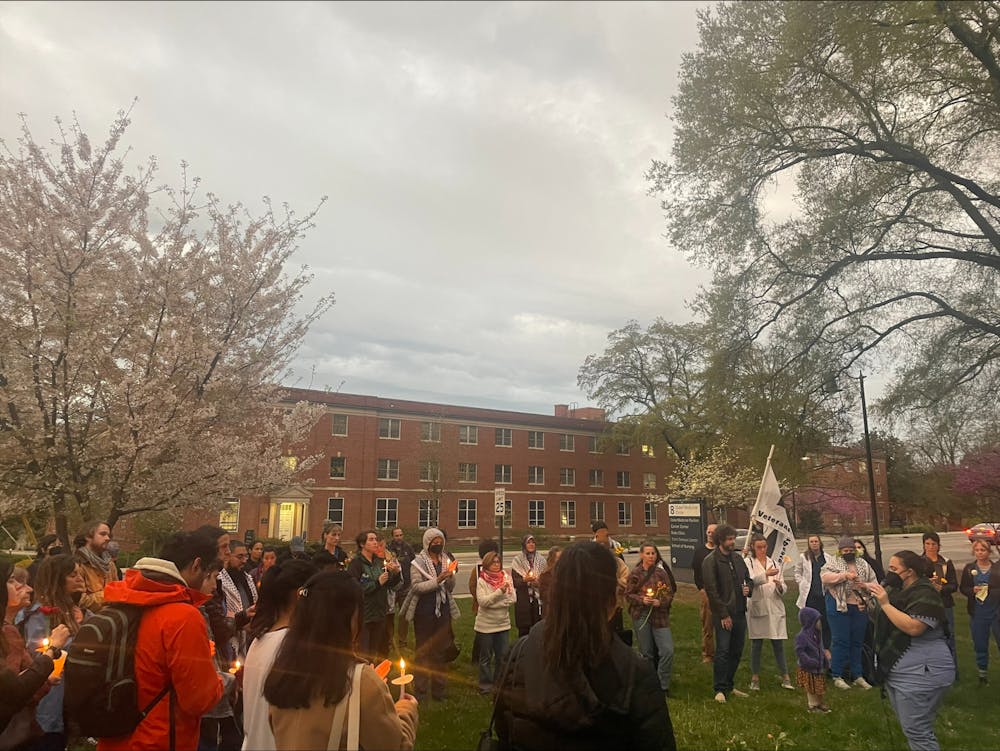Triangle Healthcare Workers for Palestine organized a vigil Tuesday near Duke Medicine Pavilion to honor the deaths of healthcare workers in Gaza and call attention to the Duke University Health System’s lack of acknowledgment for a petition sent by THWP two weeks prior.
In its petition, THWP demanded Duke Health and University of North Carolina Health publicly call for a cease-fire in Gaza, support the entrance of humanitarian aid and condemn the “continuing medical violence” against Palestinians and their healthcare infrastructure.
“Duke Health's lack of response and action is in direct opposition to the institution's value of integrity, as well as its mission to improve global health,” THWP wrote in its petition. “How can an institution committed to improving global health and embodying integrity stay silent in the face of a humanitarian and public health crisis?”
Nearly 200 Duke Health healthcare workers signed the petition, which was sent March 12 to Craig Albanese, CEO of Duke University Health System. Albanese did not respond to the organization’s demands, and Duke Health did not respond to The Chronicle’s request for comment.
About 80 people gathered at the vigil to listen to organizers speak about the ongoing war in Gaza. Organizers passed out candles and poppies, a Palestinian symbol, to the attendees.
According to the Gaza Health Ministry, Israel’s attacks in Gaza have killed at least 32,333 Palestinians, though this number may be inaccurate due to the number of people who have yet to be accounted for. The Ministry released in early February that 340 medical personnel were killed by the Israel Defense Forces.
“It is in the spirit of care and healing and grief … that these medical providers are unable to and prevented from offering, that we hold this space tonight,” said Meredith Wilkinson, one of the event’s organizers. “And we are also here because we're demanding that our hospitals break their silence.”
In his speech, Rashid Abdullah, a registered nurse in North Carolina, questioned the complicity of institutions in “stay[ing] on the sidelines and not condemn[ing] the actions [of the Israeli army].”
The organizers also played six recordings of Palestinian medical workers who recounted their experiences in Gaza since Oct. 7. In response to each of the stories, the attendees chanted, “We hear you, and we will act.”
“Have you ever imagined that everything around you would turn into a cemetery?” asked Ezz Lulu, a fifth year medical student at the Islamic University of Gaza, describing the conditions Palestinians face in Gaza.
The other speakers in the recordings highlighted the conditions within the hospitals, highlighting in particular the lack of supplies that they say they have available to treat their patients with.
According to Dominic Allen, representative for the state of Palestine at the United Nations Population Fund, Haider abu Sunima, a medical doctor in a Rafah hospital, spoke to him about the “health and infrastructure and the birthing conditions in Gaza.” Allen noted that Sunima’s hospital lacks “some of the most basic supplies,” pointing to gauze and sutures as examples.
The attendees also listened to a recording of Abdelwaheb Abu Warda, a surgeon at Al-Shifa Hospital, who shared his love for Gaza and desire to continue to help support its people throughout the war. Warda also added how doctors are donating their own blood to their patients due to the lack of available supply.
“I don't want to leave Gaza. I love everything in Gaza. I love the streets of Gaza and I want to stay here to help our people,” he said.
“[The Israeli military is] threatening to execute more of the medical staff if they do not follow their orders,” said Adham Chehade, Danish Palestinian nurse. “So my message to all of you is how long are we going to wait? How many children must die? How many hospitals must be bombed before you do anything? The people need your help.”
The organizers also shared audio recordings from Mohammed Alharara, a doctor who worked at Al-Shifa Hospital during the initial attack and has since transferred to Nasser Medical Complex as a volunteer, in addition to news source Al Jazeera.
“And our leaders still stand on the sidelines and not say anything … They're silently complicit in the actions of the Israeli army,” Abdullah said. “Despite all this, I'm not discouraged. I'm not discouraged because I know I'm not alone.”
Get The Chronicle straight to your inbox
Signup for our weekly newsletter. Cancel at any time.

Abby Spiller is a Trinity sophomore and editor-in-chief of The Chronicle's 120th volume.

